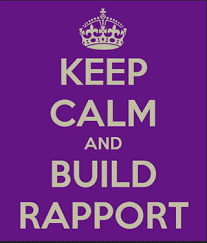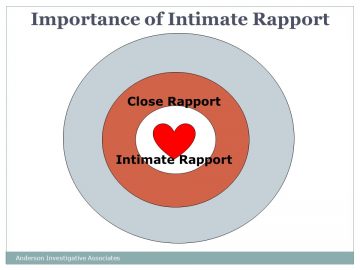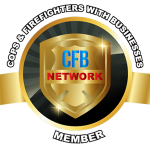
“Rapport is the ability to enter someone else’s world, to make him feel that you understand him, that you have a strong common bond.”
–Tony Robbins
This is the first in a series of three blog posts on the intricacies and application of rapport to the interview process. The concept of rapport is simple, and certainly shouts of common sense, but the research statistics regarding its use and application are dismal. Despite its clearly defined value to the interviewer, less than 10% of all interviews have adequate rapport developed. I speak to interviewers all the time that believe if they talk about football and the weather, then they have rapport covered. This is an oversimplification and underestimation of what can be a complex tool for us.
Rapport is a word that we don’t hear a great deal in our daily spoken landscape, but it is one imperative to master in interviewing. Recently, I was doing interviewing instruction to criminal justice emphasis students in our local high school, about 60 of them, and asked how many knew what rapport was. Not one did. So we talked a great deal about its value and how to implement it in the interview process. It is one of the tools that will set us apart from mediocre interviewers and allow us to excel in interviewing.
So not to be too basic, here is what rapport is:
rap·port: /raˈpôr,rəˈpôr/; noun
- a close and harmonious relationship in which the people or groups concerned understand each other’s feelings or ideas and communicate well.
| “she was able to establish a good rapport with the children” |
This is an interview that lasts a few hours, how much rapport can actually be developed. If done artfully it is absolutely amazing the depth of rapport that can be obtained. However, to do this we must understand rapport and be prepared to work this tool. There are different levels of rapport. You know this just from the different levels of connection you feel with people you pass on the street; as compared to friends you enjoy lunch with, as compared to close family members. Rapport can be broken down to three levels.
- Intimate Rapport: Family and Friends.
- Close Rapport: Co-workers and Supervisors.
- Casual or no Rapport: Citizens and/or Suspects.

Rapport Fundamentals
- Don’t criticize, condemn, or complain
- Give sincere appreciation
- Create a desire for the person to want to tell the truth
- SMILE! Be friendly and cordial
- Be interested in the person
- Use the person’s first name if appropriate
- Develop good listening skills to encourage the individual to talk (encourages others to do the talking)
- Talk in terms that the other person will understand
- Find issues you can agree upon (get them to start saying yes)
- Make them feel that their ideas, comments, and opinions are important
- Try to understand the other person’s point of view
- Allow the other person to save face/pride
- Praise even the slightest improvement or good behavior
- Use encouragement to make fault seem easy to correct
- Attire should match or be one level above the interviewee
Other rapport considerations; offering of food, drink or cigarettes; praising and acceptance of the suspect; and how the interviewee is addressed throughout the interview.
During a two agent interview be prepared to swap primary and secondary roles based on background information and overall dynamics of the interaction of the individuals involved in the interview.
Rapport is a vital part of a successful interview, and the interviewer must have the ability to communicate with various types of people and the ability to converse on many subjects. Rapport could be “small talk” or just the impression that you are treating the interviewee with respect and dignity without compromising the interviewer’s integrity and credibility.
Anderson Investigative Associates is positioned to custom tailor training to your specific needs. If you have any questions, or would like to discuss the above or any training need, please reach out to me. Additional issues pertaining to interviewing and investigations can be found in other blogs that I have written and are contained in most blocks of instruction that our company presents.
If you have additional questions or comments, give me a shout. In the meantime, be well and be safe out there.
Mark A. Anderson
Director of Training and Development
Anderson Investigative Associates, llc
114 Loucks Avenue
Scottdale, PA 15683
manderson@andersoninvestigative.com
tel:912-571-6686
